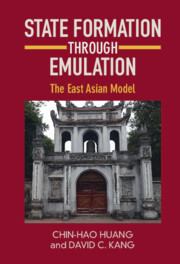
- Cited by 3
-
Cited byCrossref Citations
This Book has been cited by the following publications. This list is generated based on data provided by Crossref.
Grynaviski, Eric and Steinsson, Sverrir 2023. Wisdom Is Welcome Wherever It Comes From: War, Diffusion, and State Formation in Scandinavia. International Organization, Vol. 77, Issue. 2, p. 294.
McDonald, Patrick J. and Galambos, Kevin 2024. Trilateral politics in hierarchy, war, and state formation. International Theory, p. 1.
Sharman, J C 2024. Against Diffusion: Power and Institutions in African–European Relations. International Studies Quarterly, Vol. 68, Issue. 2,
- Publisher:
- Cambridge University Press
- Online publication date:
- July 2022
- Print publication year:
- 2022
- Online ISBN:
- 9781009089616




